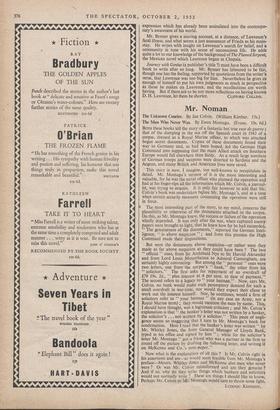Mr. Noman
BOTH these books tell the story of a fantastic but true ruse de guerre ; that of the dumping in the sea off the Spanish coast in 1943 of a corpse, dressed as a Royal Marine officer, to which was attached bogus secret documents. Copies of these documents found their way to Germany and, as had been hoped, led the German High Command into supposing that the main Allied attack on Southern Europe would fall elsewhere than Sicily. As a result large numbers of German troops and weapons were diverted to Sardinia and the Aegean, and many British and American lives were saved.
This story is now, I imagine, too well-known to recapitulate in detail. Mr. Montagu's version of it is the more interesting and valuable, for he was the naval officer who planned the operation and had at his finger-tips all the information which Mr. Colvin, a jctumal- ist, was trying to acquire. It is only fair however to add that Mr. Colvin's book was undertaken before Mr. Montagu's, and at a time when certain security measures concerning the operation were still in force.
6 The most interesting part of the story, to my mind, concerns the plausibility or otherwise of the documents attached to the corpse. On this, as Mr. Montagu knew, the success or failure of the operation wholly depended. It was only after the war, when captured enemy papers were brought to light, that he knew how far he had succeeded. ' The genuineness of the documents," reported the German Intel- ligence, " is above suspicion " ; and from this premise the High Command made their dispositions.
• But were the documents above suspicion—or rather were they made as far above suspicion as they could have been ? The two " official " ones, from Sir Archibald Nye to Sir. Harold Alexander and from Lord Louis Mountbatten to Admiral Cunningham, are certainly highly convincing. But among the " personal " ones were two letters, one from 'the corpse's " bank," the other from his solicitors." The first asks for repayment of an overdraft of £79 19s. 2d., " plus interest at 4 per cent. to date of payment." The second refers to a legacy to " your batman." Now, says Mr. Colvin, no bank would make such peremptory demand for such a small overdraft in war-time, nor would they expect their client to work out the interest himself. Nor, he continues, would a firm of solicitors refer to " your batman " (in any case an Army, not a Royal Marine term) • they would mention the man by name. This, I should have thought, was a legitimate criticism ; and Mr. Colvin's explanation is that " the banker's letter was not written by a banker, the solicitor's ... not written by a solicitor." This piece of negli- gence seems so staggering that I turn to Mr. Montagu's book for confirmation. Here I read that the banker's letter was written ". by Mr. Whitley Jones, the Joint General Manager of Lloyds Bank, typed in his office and signed by him " ; while for the solicitor's letter Mr. Montagu " got a friend who was a partner in the firm to round off the picture by drafting the following letter, and writing it on McKenna and Co.'s note-paper."
Now what is the explanation of all this ? Is 'Mr. Colvin right in his assertions and are—as would seem feasible from Mr. Montagu's preface—Messrs. Whitley Jones and McKenna also men who never were ? Or was Mr. Colvin misinformed and are they genuine ? And if so, why do they write things which bankers and solicitors would not normally write ? These are things I should like to know. Perhaps Mr. Colvin or Mr. Montagu would care to throw some light.
LUDOVIC, KENNEDY.


















































 Previous page
Previous page